If you have a passion for music, then you might be interested in learning how to create or produce music with an online music production degree.

You may be afraid to pursue a degree in music because you believe the chances of actually “going anywhere” with a music degree is nearly impossible. But there are so many career paths in digital music production.
Editorial Listing ShortCode:
If performing is your dream, you can pursue it. If producing music behind the scenes sounds ideal, you can pursue that path too. You might even have the opportunity to do both.
Online Music Production Degrees

Music production is the process of creating music. All music must go through the production process, regardless of whether it was created in a high-tech studio or at home.
This process captures, manipulates, and preserves the music so that it can be enjoyed by others. A degree in music production focuses on the techniques behind this production process. Your studies may cover how to use digital recording equipment to multitrack record, overdub, edit, and mix music in a variety of styles.
Coursework usually includes topics like music theory and history, recording and mixing, and specific music applications, like sound design for gaming or animation. Many schools also offer music performance or songwriting classes, but you may also take classes in music business, accounting, and marketing.
Editorial Listing ShortCode:
A music production major may go on to pursue careers as songwriters or musicians. Others work toward becoming music producers, artist representatives, or music distributers. Some artists work a combination of jobs, such as teaching and performing, to enjoy a steady stream of income in between performances.
Here are a number of careers related to music production:
- Music producer
- Recording engineer
- Mix engineer
- Live sound engineer
- Sound technician
- Mastering engineer
- Teacher
There are various roles that involve working in the creative, productive, or logistical side of music.
Music Production and Sound Design Careers & Salaries
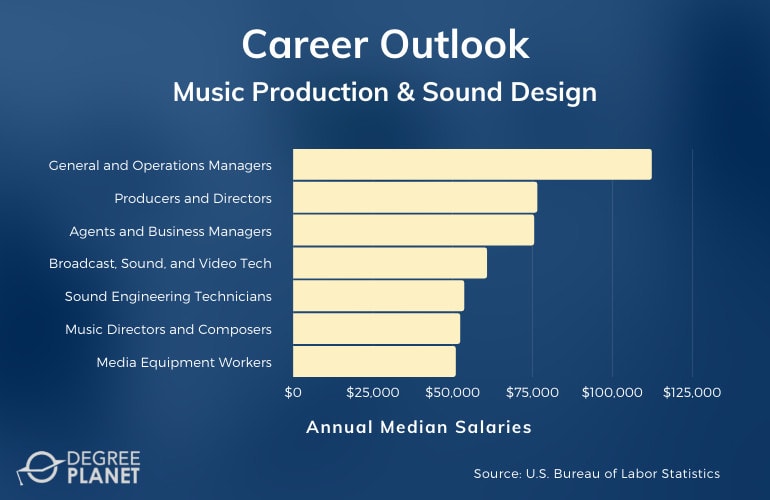
Music producers can work in a variety of industries and settings. Most music production majors find work in industries such as sound recording, motion picture and video, radio, television, performing arts, and education.
According to the Bureau of Labor Statistics, the following careers are related to the lucrative field of music production.
| Careers | Annual Median Salaries |
| General and Operations Managers, Sound Recording Industries | $112,240 |
| Producers and Directors | $76,400 |
| Agents and Business Managers of Artists, Performers, and Athletes | $75,420 |
| Broadcast, Sound, and Video Technicians, Motion Picture and Sound Recording Industries | $60,650 |
| Sound Engineering Technicians | $53,520 |
| Music Directors and Composers | $52,250 |
| Media and Communication Equipment Workers | $50,870 |
| Audio and Video Technicians | $47,920 |
| Broadcast, Sound, and Video Technicians, Performing Arts, Spectator Sports, and Related Industries | $47,540 |
| Broadcast Technicians | $43,570 |
The median wage for musicians and singers is $31.40 per hour, with most earning hourly wages between $11.17 and $87.47 (Bureau of Labor Statistics). Since performing musicians and singers often work part-time or intermittently, the Bureau of Labor Statistics only has data for the median hourly wage of these positions.
Bachelors in Music Production Curriculum & Courses

Every music production program is different. The classes you take will vary based on your program, your specialization, and your area of concentration.
The following is a list of courses that are common to most music production programs:
- Acoustics: In this class, you’ll improve your editing and mixing skills by learning the ins and outs of acoustics.
- The Art of Mixing: This class studies the creative and technical aspects in today’s music production environment.
- Audio Fundamentals for Recording: Understanding audio and audio systems is a must for audio production.
- Critical Listening 1: This course provides recording musicians and aspiring producers and engineers with a better sense of the mixing process.
- Microphone Techniques: This course is designed to give you the solid background and skill set necessary for successfully planning and implementing recording sessions.
- Mixing and Mastering with Pro Tools: This class teaches more advanced mixing and mastering techniques.
- Music Production Analysis: You’ll learn a step-by-step approach of the essential elements of successful records.
- Pro Tools 101: In this course, you’ll learn the basic principles you’ll need to create a Pro Tools project.
- Pro Tools 110: This class teaches you to work with expanded hardware and software configurations, developing versatile tools for manipulating and editing audio MIDI data.
- Vocal Production: This course guides you through the essential concepts and methods to master the craft of vocal production.
Most programs list their classes on their website. If yours does not, you can contact the admissions department.
How to Choose a Bachelor in Music Production Online Degree Program

There are many music production programs available in the online world. How do you know which one is right for you? While it’s helpful to consider cost, curriculum, and enrollment numbers, it’s also beneficial to find a program that best suits your career aspirations.
Here are some factors to consider when searching for your program:
- Identify your goals. Some programs focus more on music theory and performance, while others have a more technical focus, such as mixing and production.
- Check the quality of the program. It’s beneficial to look for a school or program that is regionally accredited and provides experienced instructors.
- Look for a program with fieldwork opportunities. Internships can help you gain hands-on experience and can provide opportunities to narrow down your specialty within the field.
- Ask schools about their facilities. It’s helpful to ensure that a program provides access to the tools of the trade, such as recording studios, digital and MIDI assets, and microphones.
It can help to compare schools using the factors that are most important to you.
Is a Bachelor Degree in Music Production Right for You?
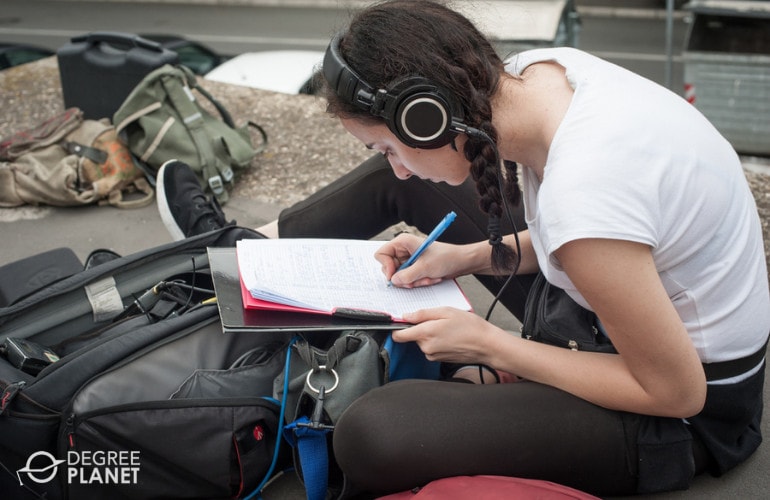
If you have a passion for music, a career in music production can allow you to provide a living for yourself while doing something you absolutely love.
Plus, you don’t have to be a singer or performer to pursue a degree in music. Professionals in the music industry also work as music producers, sound engineers, teachers, composers, songwriters, and even music therapists.
Editorial Listing ShortCode:
If performing does interest you but you’re worried about making a living, you might consider working in the production side of the industry to supplement your performance salary. If you love music and are interested in learning the technical aspects of production, then a bachelor’s degree in music production might be a good fit for you.
What Qualifications Do You Need to Be a Music Producer?
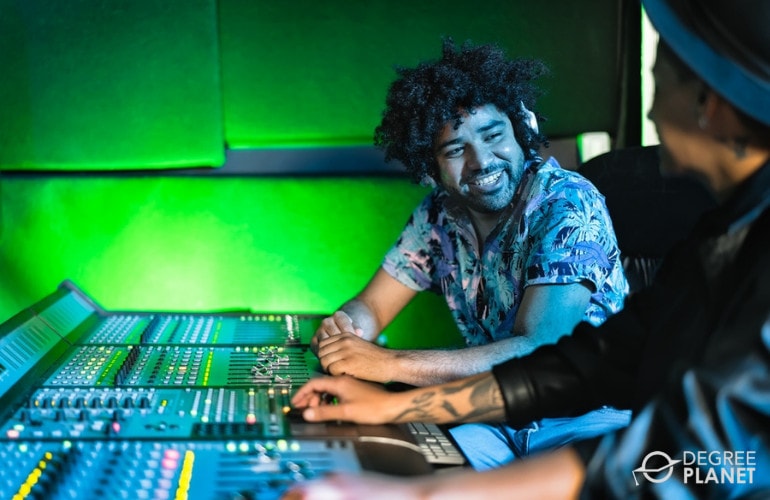
Your program can help you develop the technical skills needed to become a music producer, but there are also some inherent skills and strengths that producers typically possess.
Here are some vital skill sets for music producers:
- Audio engineering. Producers use a sophisticated range of audio equipment and need to be comfortable and adept with this technology.
- Business. Many music producers are also entrepreneurs or work in the business-end of the industry.
- Communication skills. Producers rely on oral, written, and verbal communication skills to describe the impact and effects of various sound techniques or to interpret the artistic vision of a client.
- Computer literacy. Music production is a digital field, so it’s beneficial to be comfortable with a computer and other digital technology, especially Pro Tools and Logic Pro.
- Leadership skills. Most music producers have exceptional leadership skills to bring and keep a production team together.
- Listening skills. Those in the music industry have well-developed listening skills.
- Project management. A music producer must also have project management skills.
- Telecommunications. Music production has always had a strong presence in television and radio, and now it also has a strong presence in social media. It’s helpful to feel comfortable in these environments.
- Video software. Audio and video software are now designed to work together, so it can be beneficial to have experience with video creation and editing.
If you want to become a music producer, it’s strategic to focus on developing these skills both inside and outside of the classroom.
Admissions Requirements

Each program has its own admission requirements, so it’s helpful to check the admissions page on your program’s website. If your program’s requirements aren’t listed, you can also contact your school’s admissions department.
Some common music producer schooling requirements include:
- SAT or ACT scores (only some schools require them)
- Personal statement, essay, or video essay
- Official academic transcripts
- Demonstration of musicianship
Supplemental materials, such as any awards earned, might also be requested.
Accreditation

Regional accreditation ensures that your school meets the highest academic standards. Accreditation organizations promote rigorous educational standards that schools voluntarily submit themselves to.
If a school meet these standards, they are awarded accreditation and deemed a high-quality school. Employers often look for candidates from accredited schools. If you attend an accredited program, your credits are more likely to be eligible for transfer. Attending an accredited school can also be a qualification for receiving financial aid.
Editorial Listing ShortCode:
To see if your school is accredited, you can visit the website of the Council for Higher Education Accreditation (CHEA).
Financial Aid and Scholarships

Federal and state financial aid is available to qualifying students who attend accredited schools, based upon need. You may qualify for federal and state grants, federal loans, or federal plus loans. You may also qualify for subsidized and unsubsidized loans.
You can fill out the Free Application for Federal Student Aid (FAFSA) to see if you qualify. Aside from financial aid, you can also apply to community and school scholarships. To find these types of opportunities, you can check with your school and the music department.
You can also start your search with community organizations, clubs, and nonprofits. You can even ask community businesses within the music industry if they provide scholarships. Many employers also provide tuition assistance.
Is Music Production a Good Career?
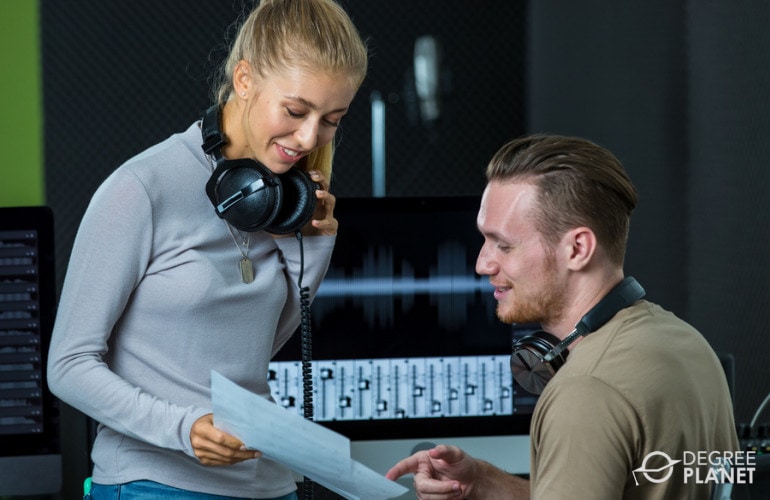
Yes, music production is a good career for many professionals. Your love of music can lead to a number of behind-the-scenes job opportunities.
For example, sound engineering technicians make a median salary of $53,520 per year, and audio and video technicians make a median of $47,920 (Bureau of Labor Statistics). These positions are seeming above average growth as well, with projected job growth of 17% and 26%, respectively.
Music directors and composers are also seeing positive job growth, and the median salary for these positions is $52,250 (Bureau of Labor Statistics).
What Does a Music Producer Do?
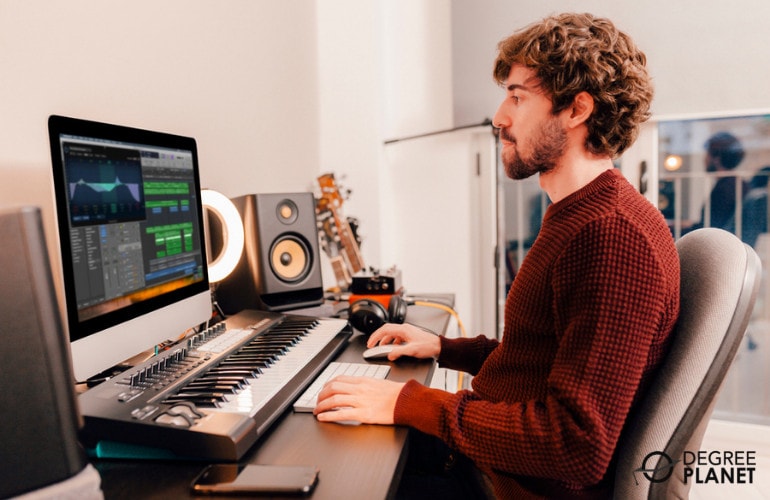
A music producer helps their client bring their song to life. It is their job to take the artist’s raw song and transform it into a finished recording. They oversee the entire process of recording the music. That’s not all they can do, though.
Producers can also:
- Supervise performance
- Sign artists to labels
- Coordinate meetings
- Write songs
- Schedule and manage recording sessions
A skilled producer can maintain a delicate balance between the demands of the work and the creative elements that make a song music.
How Much Do Music Producers Make?

The Bureau of Labor Statistics categorizes music producers in the broader category of producers and directors. The median salary for this job category is $76,400 a year.
The median salary for producers and directors in the performing arts, spectator sports, and related industries is $62,860. The median for those in the recording industries is $66,770. Most producers and directors make between $36,070 and $184,660 a year (Bureau of Labor Statistics). A professional’s salary can depend on their employer, their work experience, their industry, and their geographic location.
What Degree Do You Need to Be a Music Producer?
Music producers often hold bachelors degrees, though some choose to advance their expertise and qualifications with a masters degree. It’s common for aspiring music producers to major in fine arts, music production, or sound engineering.
Editorial Listing ShortCode:
The level of education required will ultimately depend on the employer, but a love of music is the underlying qualifier to be a music producer. Skill is also beneficial, but many programs can help you develop the necessary artistic and business skills.
What Can You Do with a Music Production Degree?
Music is a part of our daily lives, spanning across many fields and industries, so a music production degree can be very versatile. Music production majors tend to work behind the scenes, either on-stage at live performances or in a studio, assisting the music producer.
Professionals in music production can also work in radio, television, business, marketing, teaching, and even therapy. Some become entrepreneurs and even produce music from the comfort of their own home. Careers related to music production include music producer, sound engineering technician, music director, and audio technician.
How Long Does It Take to Get a Music Production Degree Online?

A traditional music production degree consists of 120 credit hours. If you follow a traditional, 16-week semester and attend full-time, it will typically take 4 years to earn a bachelors degree.
Many online music degree programs may be completed in less time. This is usually the case whether it’s an online music performance, an online music production, or an online music technology degree.
If you follow an 8 week semester and stay continuously enrolled year-round, you may be able to finish in less time. There are also programs that allow you to go at your own pace if you need to attend part-time or work around other responsibilities. Attending part-time will often take you longer to complete your degree program.
Is There a Demand for Music Producers?
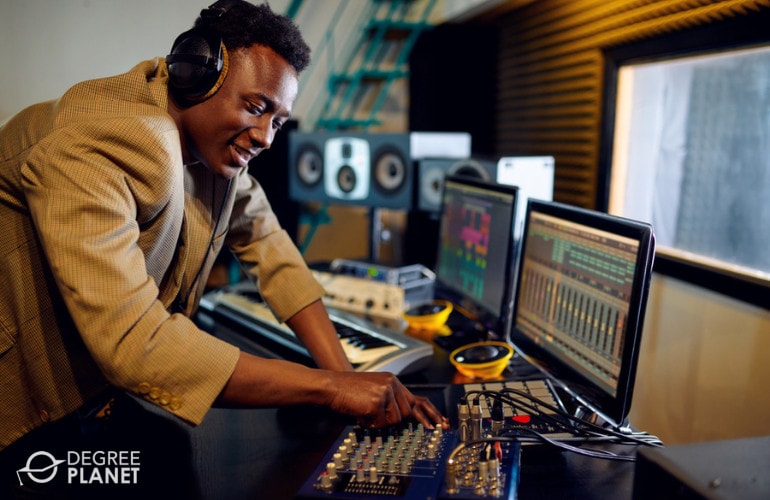
Yes, there is a high demand for music producers. The Bureau of Labor Statistics lumps music producers together with the overall category of producers and directors, and employment for these positions is projected to grow 24% over the next ten years.
Entertainment and sports occupations is projected to grow 22% over the same time period, and the Bureau of Labor Statistics projects 21% growth for broadcast, sound, and video technicians. This shows how the overall entertainment and music categories are seeing a trend of above average growth.
With the explosion of streaming services, music producers might also find work in the motion picture and television industry.
Should You Get an Online Degree in Music Production?
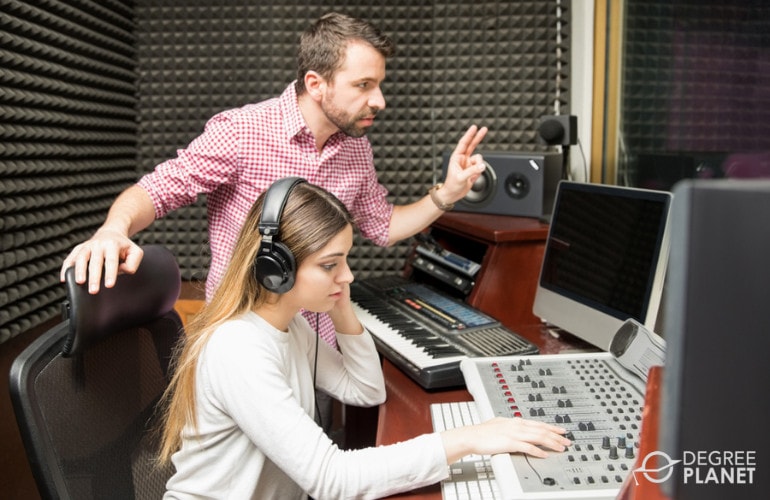
An online degree in music production can help you develop the necessary technical skills and artistic knowledge for this creative field.
Online degree programs can offer:
- Industry leading instructors. When attending an accredited university, you can trust that you’re learning according to industry standards.
- Guided learning. You have the same flexibility as those who are self-taught but with the assurance of hands-on, constructive feedback that can help you learn faster and grow confident in your abilities.
- Networking opportunities. Music programs can present opportunities to meet other musicians or aspiring music producers.
An online degree might offer you the instruction that you need to prepare you for the music industry.
What’s the Difference Between Audio Engineering vs. Music Production?
A music producer is in charge of bringing a songwriter’s vision to life, managing the entire process. Meanwhile, an audio engineer records the production.
| Audio Engineer | Music Producer |
|
|
Bigger music projects often have the budget for hiring the two separate roles, but more low-key productions may have one person acting as both music producer and audio engineer.
Is a Music Production Degree Worth It?

Yes, a music production degree is worth it for many students. Music producers aren’t only needed to help artists and songwriters bring their vision to life.
They’re also needed in the movie and television industry, gaming industry, and even social media and marketing industries. All of these fields are growing faster than average, according to the Bureau of Labor Statistics. These settings all need music and sound for their productions, games, marketing, and advertising efforts.
Editorial Listing ShortCode:
With a music production degree, you can develop a versatile skill set that’s applicable in a variety of creative industries.
Universities Offering Online Bachelors in Music Production Degree Programs
Methodology: The following school list is in alphabetical order. To be included, a college or university must be regionally accredited and offer degree programs online or in a hybrid format.

The Academy of Art University offers a Bachelor of Fine Arts in Music Production. To graduate, students must complete 132 credit hours. Online classes are either 7.5 or 15 weeks long. Those interested in the program must submit an online application with official transcripts.
Academy of Art University is accredited by the WASC Senior College and University Commission.

Berklee College of Music offers a Bachelor of Arts in Music Production. To graduate, students must complete 120 credit hours, including 33 elective credit hours. To be eligible for the program, applicants must submit an online application with 2 letters of recommendation and either a written or video essay.
Berklee is accredited by the New England Commission of Higher Education.

Judson College offers a Bachelor of Arts in Music. The program is a distance learning program that allows students to study online. Students must complete a minimum of 57 credit hours and 2 recitals to graduate. Applicants must have a minimum GPA of 2.0 or a GED and government-issued ID.
Judson College is accredited by the Southern Association of Colleges and Schools Commission on Colleges.

Liberty University offers a Bachelor of Science in Commercial Music. To graduate, students must complete 120 credit hours. All classes are 8 weeks long and completed online. Applicants must have a GPA of 2.0 or higher and official transcripts from all schools attended.
Liberty University is accredited by the Southern Association of Colleges and Schools Commission on Colleges.

Rocky Mountain College of Art and Design offers an online Bachelor of Fine Arts in Music Production. Students must complete 123 credit hours to graduate. Each class is 8 weeks long. Applicants must complete an interview with an admissions counselor and submit an application with a portfolio.
Rocky Mountain College of Art and Design is accredited by the Higher Learning Commission.

The University of Maine—Augusta offers a Bachelor of Music in Contemporary and Popular Music. The program usually takes 4 years to complete and requires 62 credit hours related to the program to graduate. Applicants must complete an audition or submit a portfolio along with their application.
The University of Maine at Augusta is accredited by the New England Commission of Higher Education.

The University of New England offers an online Bachelor of Music. The program can typically be completed in 3 years of full-time study. Students must complete 120 credit hours to graduate. To be eligible for the program, applicants must complete an audition with 2 musical pieces and submit a personal statement.
The University of New England is accredited by the New England Commission of Higher Education.

The University of Oregon offers a Bachelor of Science in Music with an option to specialize in Music Technology. To graduate, students must complete 180 credit hours, including a senior project. To be eligible for the program, applicants must submit an online application and either submit a portfolio or have an audition.
The University of Oregon is accredited by the Northwest Commission on Colleges and Universities.

Valley City State University offers both a Bachelor of Arts and a Bachelor of Science in Music. Students must complete 120 credit hours in 4 years to graduate. Applicants must apply online through the school’s website and submit ACT test scores, a small application fee, and either official high school transcripts or proof of a GED.
Valley City State University is accredited by the Higher Learning Commission of the North Central Association of Colleges and Schools.

Virginia Wesleyan University offers a Bachelor of Arts in Digital Music. To graduate, students must complete 120 credit hours, with 39 credits dedicated to the major. Applicants may apply online with official high school transcripts and either their ACT or SAT test scores.
Virginia Wesleyan University is accredited by the Southern Association of Colleges and Schools Commission on Colleges.
Getting Your Bachelor’s Degree in Music Production Online

Music is an important part of our everyday lives. Music can impact our emotions, behavior, and productivity. It can pump us up, calm us down, or help us focus.
It can even move us to take action or move us to tears. If you are drawn to music, it might be time for you to take action and pursue an online degree in music production. Credible, online degrees are available from accredited universities.
You can start exploring online degrees in music production today!

